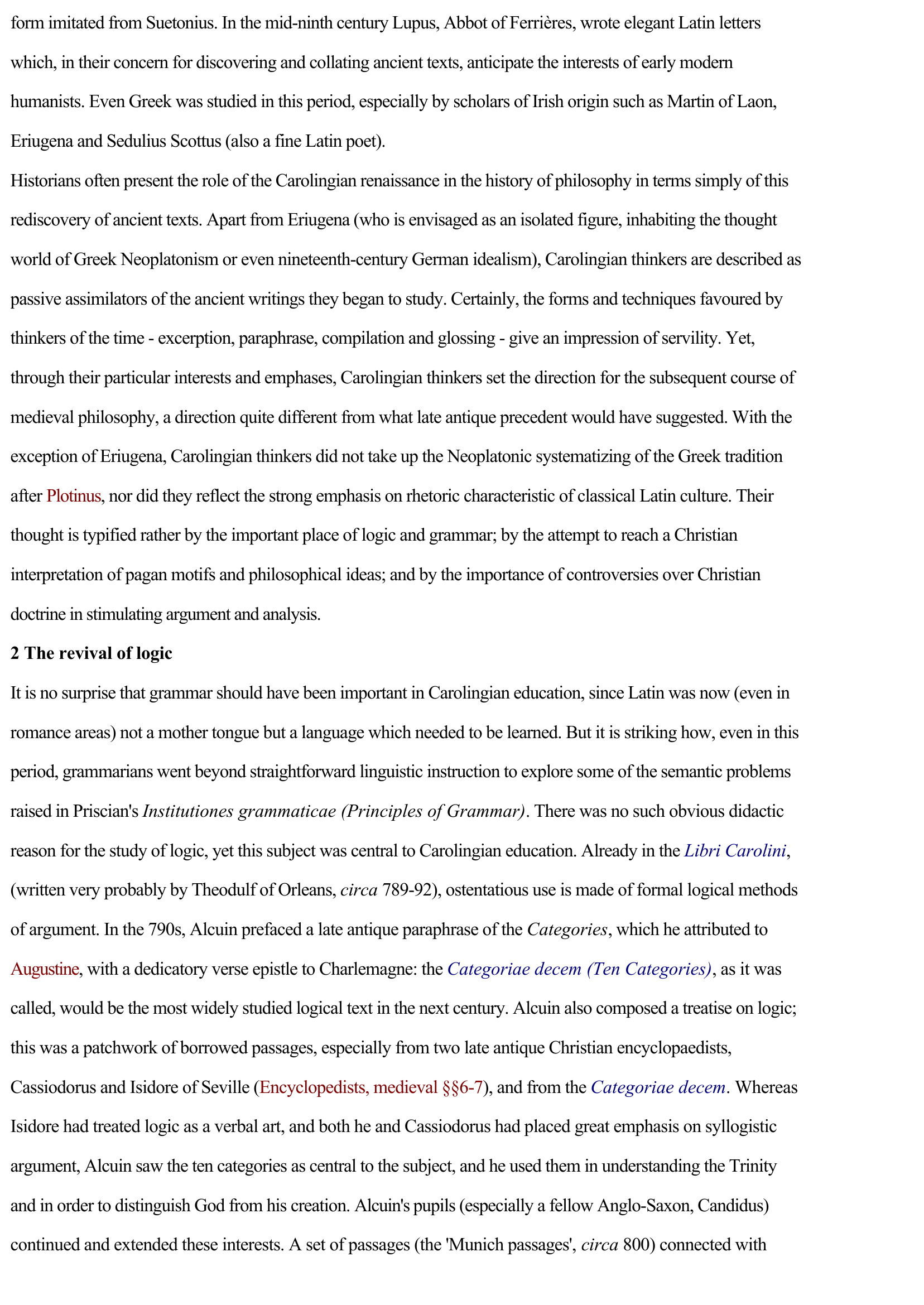Carolingian renaissance
Publié le 22/02/2012

Extrait du document
«
form imitated from Suetonius.
In the mid-ninth century Lupus, Abbot of Ferrières , wrote elegant Latin letters
which, in their concern for discovering and collating ancient texts, anticipate the interests of early modern
humanists.
Even Greek was studied in this period, especially by scholars of Irish origin such as Martin of Laon,
Eriugena and Sedulius Scottus (also a fine Latin poet).
Historians often present the role of the Carolingian renaissance in the history of philosophy in terms simply of this
rediscovery of ancient texts.
Apart from Eriugena (who is envisaged as an isolated figure, inhabiting the thought
world of Greek Neoplatonism or even nineteenth-century German idealism), Carolingian thinkers are described as
passive assimilators of the ancient writings they began to study.
Certainly, the forms and techniques favoured by
thinkers of the time - excerption, paraphrase, compilation and glossing - give an impression of servility.
Yet,
through their particular interests and emphases, Carolingian thinkers set the direction for the subsequent course of
medieval philosophy, a direction quite different from what late antique precedent would have suggested.
With the
exception of Eriugena, Carolingian thinkers did not take up the Neoplatonic systematizing of the Greek tradition
after Plotinus , nor did they reflect the strong emphasis on rhetoric characteristic of classical Latin culture.
Their
thought is typified rather by the important place of logic and grammar; by the attempt to reach a Christian
interpretation of pagan motifs and philosophical ideas; and by the importance of controversies over Christian
doctrine in stimulating argument and analysis.
2 The revival of logic
It is no surprise that grammar should have been important in Carolingian education, since Latin was now (even in
romance areas) not a mother tongue but a language which needed to be learned.
But it is striking how, even in this
period, grammarians went beyond straightforward linguistic instruction to explore some of the semantic problems
raised in Priscian's Institutiones grammaticae (Principles of Grammar) .
There was no such obvious didactic
reason for the study of logic, yet this subject was central to Carolingian education.
Already in the Libri Carolini ,
(written very probably by Theodulf of Orleans, circa 789-92), ostentatious use is made of formal logical methods
of argument.
In the 790s, Alcuin prefaced a late antique paraphrase of the Categories , which he attributed to
Augustine , with a dedicatory verse epistle to Charlemagne: the Categoriae decem (Ten Categories) , as it was
called, would be the most widely studied logical text in the next century.
Alcuin also composed a treatise on logic;
this was a patchwork of borrowed passages, especially from two late antique Christian encyclopaedists,
Cassiodorus and Isidore of Seville ( Encyclopedists, medieval §§6-7 ), and from the Categoriae decem .
Whereas
Isidore had treated logic as a verbal art, and both he and Cassiodorus had placed great emphasis on syllogistic
argument, Alcuin saw the ten categories as central to the subject, and he used them in understanding the Trinity
and in order to distinguish God from his creation.
Alcuin's pupils (especially a fellow Anglo-Saxon, Candidus)
continued and extended these interests.
A set of passages (the 'Munich passages' , circa 800) connected with.
»
↓↓↓ APERÇU DU DOCUMENT ↓↓↓
Liens utiles
- En quoi la Renaissance est-elle une période marquée par les ruptures ?
- questions de civilisations la renaissance
- Les textes et les images de l'art de la Renaissance
- LA RENAISSANCE EN PHILOSOPHIE
- La Renaissance du XIIe siècle

































